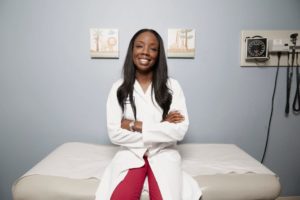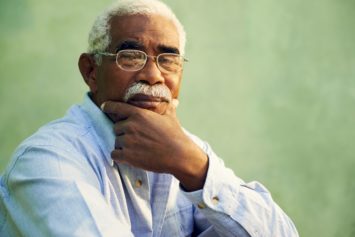
Dr. Nadine Burke Harris. Image courtesy of DrNadineBurkeHarris.com
San Francisco pediatric physician Nadine Burke Harris searched her mind for answers as she saw more and more of her young patients suffering with asthma, chronic abdominal pain and ADHD, among a host of other ailments. Harris knew several kids were grappling with similar diagnoses, but that there could also be a single factor at the root of the problem.
That’s what led her to found her own pediatric practice — located in the heart of a low-income San Francisco community — specializing in the treatment of chronic disease brought on by adverse childhood experiences, or ACES.
According to the Washington Post, Harris based her new practice on the findings of a decade-old study that showed a significant link between chronic illness and traumatic childhood experiences like physical abuse or neglect, or living with a family member who struggled with drug or alcohol abuse. It was then she realized how such high “doses” of adversity negatively impacted the growing brains and bodies of young children.
Her practice, the Center for Youth Wellness located in San Francisco’s Bayview-Hunters Point neighborhood, is unique in that it uses a method that not only examines a patient’s medical history, but their social history as well.
With the help of the Bayview Child Health Center, Harris’ practice works to screen every child who comes in for ACES that may lead to toxic stress and lifelong health issues down the road, according to the clinic’s website.
“We heal children’s brains and bodies by piloting treatments for toxic stress and sharing our findings nationally,” it states. “We prevent toxic stress by raising awareness among those who can make a difference: from parents and pediatricians to policy makers. Our mission is to improve the health of children and adolescents exposed to [ACES].”
Per the Washington Post, Harris opened a second clinic for her young patients who screened positive for traumatic childhood experiences. There, the child and his/her family can consult with mental health professionals who teach them relaxation techniques, or case workers who can then connect them to child social services.
For Harris, the end goal is to have every pediatrician screening children for ACES.
“Does it seem like a difficult problem to solve? Yes,” the UC Davis grad said of the already daunting task for doctors to treat and diagnose patients for a litany of issues in quick 15-minute sessions. “Does it seem harder than cancer? I don’t know. Medicine and public health are all about solving hard problems.”
Despite the challenges, Harris hopes the medical community will eventually evolve and respond to the stunning research behind ACES and chronic illness. The research she cited in particular, conducted by Kaiser Permanente and the Centers on Disease Control, found that traumatic childhood experiences were incredibly common.
Two-thirds of the 17,000 Kaiser patients surveyed for the study reported at least one ACES; one in six patients reported at least four, according to the Washington Post.
Compared to those who experienced no childhood trauma, those with four or more adverse experiences were twice as likely to be diagnosed with cancer or heart disease; seven times more likely to be alcoholics; six times as likely to suffer from depression; and 12 times more likely to have attempted suicide.
Those exposed to ACES were also more likely to engage in risky behaviors like intravenous drug use and early sexual activity, the publication reports.
Since its publishing a decade ago, the study’s findings have slowly begun to shape scientists’ understanding of how increased amounts of stress affect the body. The research has since influenced the practices of brain researchers, school teachers and even police departments.
“I went to medical school; I never heard about this,” Harris said of the research. “When I did, I wanted to shout it from the rooftops.”
Harris’ novel approach to pediatric treatment has even helped influence the medical practice of Jessica Weisz, a fellow pediatrician at CCI Health and Wellness Services in Takoma Park, Maryland. Per the Washington Post, Weisz mainly serves Latino patients and families, so her ACES questionnaire features questions about immigration-related stressors.
Some pediatricians are even developing questions regarding urban-related stressors such as how safe a person feels in their neighborhood or if they’ve witnessed any violence. Either way, Harris said the new strategies being developed are good because they show that the research can be applied universally.
Through it all, the 40-year-old physician said she must remember to work on mitigating stressors in her own life.
“I have to work to manage my own stress,” Harris said. “I love my job, but it’s stressful. It’s really important for me to take care of myself.”

